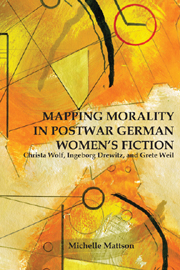Book contents
- Frontmatter
- Contents
- Acknowledgments
- Introduction
- 1 The Individual, Memory, and History
- 2 Feminism, the Self, and Community
- 3 Ingeborg Drewitz: Families, Historical Conflict, and Moral Mapping
- 4 Christa Wolf: Rehearsing Individual and Collective Responsibility
- 5 Grete Weil: The Costs of Abstract Principles
- Conclusion
- Bibliography
- Index
4 - Christa Wolf: Rehearsing Individual and Collective Responsibility
Published online by Cambridge University Press: 05 February 2013
- Frontmatter
- Contents
- Acknowledgments
- Introduction
- 1 The Individual, Memory, and History
- 2 Feminism, the Self, and Community
- 3 Ingeborg Drewitz: Families, Historical Conflict, and Moral Mapping
- 4 Christa Wolf: Rehearsing Individual and Collective Responsibility
- 5 Grete Weil: The Costs of Abstract Principles
- Conclusion
- Bibliography
- Index
Summary
CHRISTA WOLF OCCUPIES A SPECIAL SPACE within the landscape of post-Second World War German literature. Legions of scholars have analyzed, interpreted, contextualized, and historicized her work. So much so that it makes one question just how much more insight we can squeeze out of her substantial body of work. Nevertheless, within the context of postwar German women writers, a book that examines how individuals look at history and how they then conceive of their own social responsibilities would be incomplete without attention to Wolf's treatment of these issues. Her 1976 novel Kindheitsmuster, a quintessential example of how Wolf's particular generation struggled to confront its own national and individual pasts, created reverberations not only in East Germany, where it was written, and in German-speaking Europe, where it was widely received and intensely scrutinized, but also in many non-German-speaking countries.
For this reason, this chapter focuses primarily on Kindheitsmuster with the occasional forward and backward glances at earlier and later works by Wolf. The approach is threefold. Beginning with a discussion of how we remember the past, the chapter then unfolds Wolf's sense of remembering as a moral activity. The conclusion analyzes the importance she sees in the relational character of identity, the interconnection of world events (both synchronically and diachronically), and the ethical implications of this realization. At different points in the chapter, the issues raised in chapters 1 and 2 factor into the analysis. From chapter 1, I am particularly interested in testing the arguments of Halbwachs, Nora, and Pennebaker and Banasik. Specifically, Wolf illustrates well Halbwachs's idea that individual memories remain embedded in collective historical experience.
- Type
- Chapter
- Information
- Mapping Morality in Postwar German Women's FictionChrista Wolf, Ingeborg Drewitz, and Grete Weil, pp. 96 - 141Publisher: Boydell & BrewerPrint publication year: 2010



